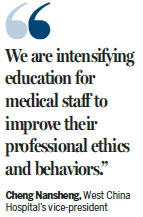Hospitals take aim at corruption
Authorities target illegal profits from 'red envelopes' and drug kickbacks
China's top health authority pledged on Monday to intensify the fight against irregularities in the health sector, such as doctors making money illegally through buying and prescribing drugs.
A new guideline from the National Health and Family Planning Commission aims to improve professionalism and services at hospitals and clinics through a variety of means, including education of medical staff, more severe punishment for irregularities and intensified supervision from health authorities to prevent corruption.
Though it was made public on Monday, the guideline was being adopted by hospitals since February, according to the commission.
Health authorities will launch targeted campaigns against violations such as overprescribing medicine, gender selection and theft of health insurance funds, the guideline said.

The commission will establish a credit system covering institutes and staff, and those involved in irregularities will be publicly identified and banned from the sector, the guideline said.
Despite increasingly tighter supervision, more efforts are needed to improve the quality and safety of healthcare services and to get rid of irregularities and corruption, said Li Luping, an inspector of medical policy and supervision at the commission.
At a top hospital in Nanjing, Jiangsu province, medical staff are being asked to hand in all their illegal gains - such as from kickbacks from drug sales - that they have received since 2006, according to a report by MD Weekly, a newspaper owned by the Chinese Medical Doctor Association. The newspaper did not give the name of the hospital.
Qiu Yonggui, head of the outpatient department of Affiliated Hospital of Nantong University, said the hospital is also launching a similar campaign and encouraging staff to voluntarily hand in all their illegal gains - including cash, shopping cards and gifts - by promising reduced punishment, according to the report.
"Medical staff must not be engaged in legal violations and irregularities such as accepting red envelopes or kickbacks with excuses such as that they have low pay," said Song Shuli, spokeswoman of the National Health and Family Planning Commission. "Red envelopes" refers to cash patients give to doctors.
"We will continue to intensify the fight against corruption in the health sector," Li said.
Cheng Nansheng, vice-president of West China Hospital, Sichuan University, said the hospital has been making greater efforts to increase communication with patients and to improve services in recent years.
"We are intensifying education for medical staff to improve their professional ethics and behavior," he said. "Many of them have also improved their communication skills with patients so they communicate in a more equal manner, which contributes to a better relationship with their patients."




















